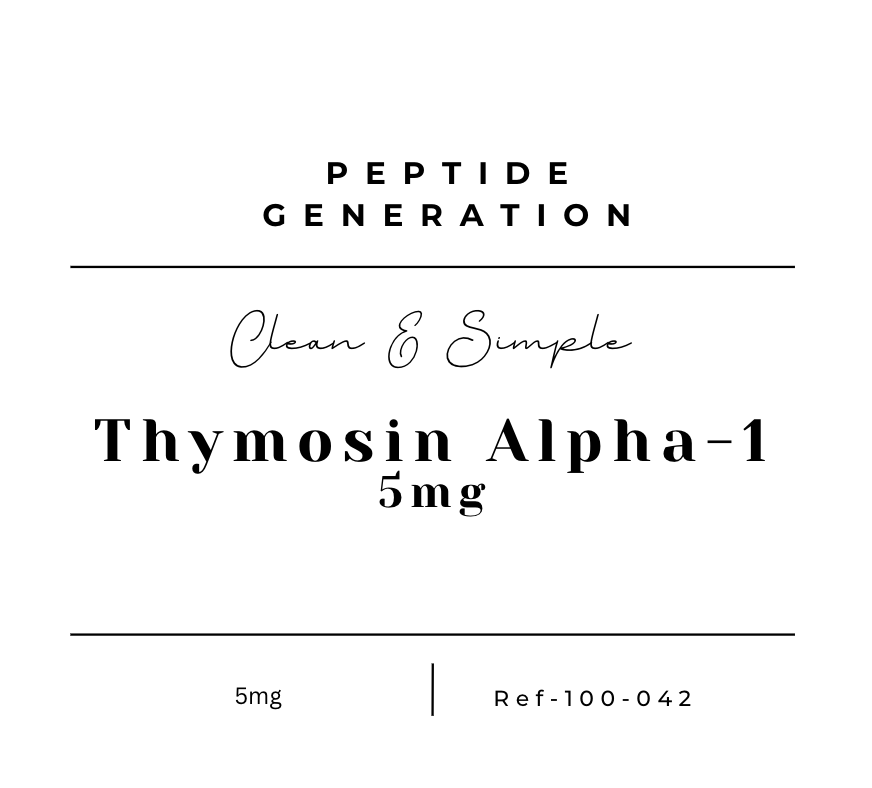 Image 1 of 1
Image 1 of 1


Thymosin Alpha-1
🔬 What Is Thymosin Alpha-1?
Thymosin Alpha-1 is a 28-amino acid peptide originally isolated from thymosin fraction 5, a thymus extract.
It is naturally produced in the thymus gland, where it helps regulate immune function.
The synthetic form (thymalfasin) is used as an immunomodulatory agent in many countries, though it is not FDA-approved in the U.S. (except under certain compassionate or investigational uses).
⚙️ Mechanism of Action
Enhances T-cell maturation and differentiation.
Boosts dendritic cell activity → improves antigen presentation.
Increases natural killer (NK) cell activity.
Modulates cytokine production (increasing IFN-α, IL-2; reducing pro-inflammatory signals).
Helps restore balance between Th1 and Th2 immunity.
In short, it fine-tunes both innate and adaptive immunity.
📌 Clinical & Research Uses
Thymosin Alpha-1 has been studied for:
Chronic viral infections: Hepatitis B & C, HIV
Cancer (as an immune adjuvant alongside chemotherapy or vaccines)
Immunodeficiency states (primary or acquired)
Sepsis and severe infections (shown to reduce mortality in some trials)
COVID-19 (studied during the pandemic for immune modulation in severe cases)
Vaccine adjuvant (improves vaccine response, especially in the elderly and immunocompromised)
⚠️ Safety & Side Effects
Generally well tolerated.
Reported side effects: mild injection site reactions, transient fatigue, headache, or flu-like symptoms.
No major toxicities documented even with long-term use.
Contraindications: avoid in patients with active organ transplantation (may alter immune balance).
✅ Key Takeaways
Thymosin Alpha-1 = naturally occurring thymic peptide, powerful immune system modulator.
Uses: chronic viral infections, immune deficiency, cancer support, sepsis, and as a vaccine adjuvant.
Dose: usually 1.6–2 mg SC 2–3x per week, scaled higher in specific protocols.
Status: Approved in >35 countries (e.g., Italy, China) but not FDA-approved in the U.S. outside investigational use.
Safety: Well tolerated with minimal side effects in studies.
🔬 What Is Thymosin Alpha-1?
Thymosin Alpha-1 is a 28-amino acid peptide originally isolated from thymosin fraction 5, a thymus extract.
It is naturally produced in the thymus gland, where it helps regulate immune function.
The synthetic form (thymalfasin) is used as an immunomodulatory agent in many countries, though it is not FDA-approved in the U.S. (except under certain compassionate or investigational uses).
⚙️ Mechanism of Action
Enhances T-cell maturation and differentiation.
Boosts dendritic cell activity → improves antigen presentation.
Increases natural killer (NK) cell activity.
Modulates cytokine production (increasing IFN-α, IL-2; reducing pro-inflammatory signals).
Helps restore balance between Th1 and Th2 immunity.
In short, it fine-tunes both innate and adaptive immunity.
📌 Clinical & Research Uses
Thymosin Alpha-1 has been studied for:
Chronic viral infections: Hepatitis B & C, HIV
Cancer (as an immune adjuvant alongside chemotherapy or vaccines)
Immunodeficiency states (primary or acquired)
Sepsis and severe infections (shown to reduce mortality in some trials)
COVID-19 (studied during the pandemic for immune modulation in severe cases)
Vaccine adjuvant (improves vaccine response, especially in the elderly and immunocompromised)
⚠️ Safety & Side Effects
Generally well tolerated.
Reported side effects: mild injection site reactions, transient fatigue, headache, or flu-like symptoms.
No major toxicities documented even with long-term use.
Contraindications: avoid in patients with active organ transplantation (may alter immune balance).
✅ Key Takeaways
Thymosin Alpha-1 = naturally occurring thymic peptide, powerful immune system modulator.
Uses: chronic viral infections, immune deficiency, cancer support, sepsis, and as a vaccine adjuvant.
Dose: usually 1.6–2 mg SC 2–3x per week, scaled higher in specific protocols.
Status: Approved in >35 countries (e.g., Italy, China) but not FDA-approved in the U.S. outside investigational use.
Safety: Well tolerated with minimal side effects in studies.

